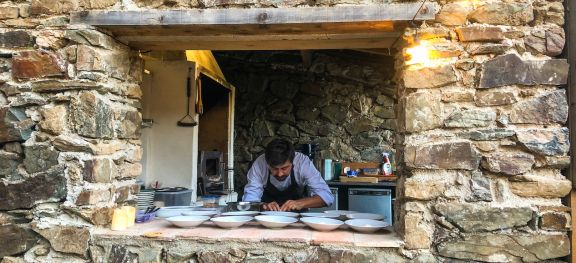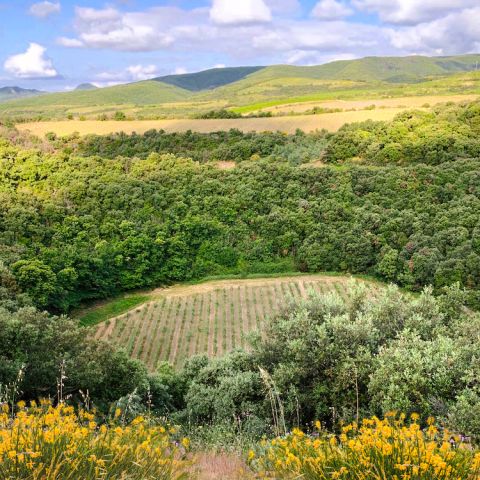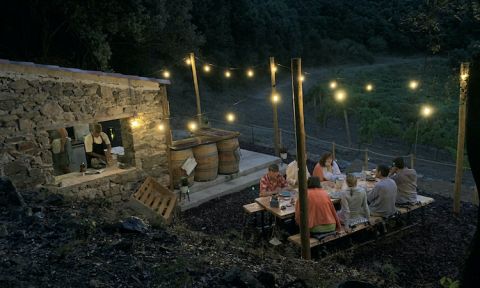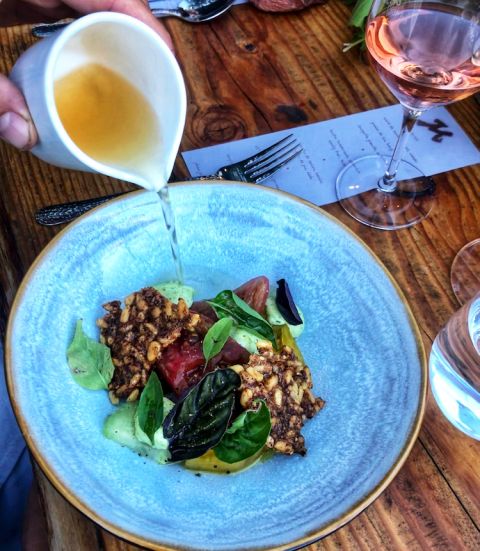Outdoor eating with a difference

A version of this article is published by the Financial Times. In the picture above, Chef Nico, the crater plater.
At the end of July I enjoyed my first meal in a crater. Ten thousand years ago a meteorite crashed into part of a property now known as Domaine du Météore, in the foothills of the Cévennes north of Béziers, and left one of the ten largest craters on earth. Syrah vines have subsequently been planted in a bowl lined with holm oaks and arbutus.
This wine estate, mainly in Faugères but with some vines in St-Chinian, was bought 18 months ago by two English doctors, Paul Jenkins and Paul Jarman, who obviously saw its potential. Last summer they built a ‘kitchen’ down in the crater, with a generator able to power a couple of fridges, a small induction hob, and lighting for the kitchen, the outdoor tables and an eco-lavatory. In March the French chef Nicolas Delorme and his Australian partner Jaclyn Sunley transferred from Dr Jenkins’ ski chalet in Verbier to the very different terrain of the Haut-Languedoc.
We met this talented, amiable, well-travelled couple in the winery’s tasting room after being delivered there from our hotel in nearby Hérépian by the new winemaker (ex-Châteauneuf) Simon Frech. We chatted over a glass of rosé and some seriously accomplished snacks such as squid-ink crackers with wasabi cream and cured anchovy, and a small bowl of spiced red-pepper cream with octopus and crisp ham fragments. This was followed by another first as I helped Delorme and Sunley shoo their chickens into their coop for the night.
More firsts followed. As Delorme drove his van down to the crater with the rest of what he had prepared, we followed Sunley on foot for the 15-minute walk down to our dinner. The rough track took us through the vegetable garden they have recently established, past a well they have discovered, and through the vines. After about 10 minutes we heard the hum of a generator. Jaclyn turned to us and said with a smile, ‘We’re almost there’.
We emerged from the undergrowth into the crater and there in front of us was an outdoor restaurant. Four tables, each of which can seat four customers, sat beside a kitchen in a wooden shed with smoke billowing out from the top from the grill, which burns old vine cuttings. The tables were attractively decorated with vine leaves, candles and shards of the schist for which this region is renowned. On them sat that night’s menu and a list of the six wines on offer by the glass.
The setting is breathtaking and ever-changing. The sun was setting and just before 8 pm the moon rose to the south-east. The natural distinctiveness of the crater should have allowed for a stage, with some live music perhaps, but the overall feeling it generated was of being in Australia: rugged Nature, the vines, the scrubland and, quite soon, some extremely good food and wine.
Delorme is a classically trained French chef who has travelled and cooked widely – in Australia, where he met Sunley, in Singapore, and he remains fascinated by Japan. He knows what he has to do: to find the best produce and to transform it as intelligently and as sensitively as he can. He seems to find the limitations of his kitchen an extra challenge and one that he rises to.
Our first dish was a couple of oysters from Maison Tarbouriech in Marseillan on the nearby Mediterranean where their ecosystem of fresh and seawater adds extra flavour. These came topped with thin slices of cured cucumber and a plum cleverly preserved in Marseillan’s vermouth Noilly Prat.
This was followed by perhaps the most creative dish of the evening, pictured below. The written description, ‘this season’s tomatoes, basil and pine nuts’, barely does it justice. Half a dozen different varieties of tomatoes from their garden, expertly peeled and confited, came in a colourful dish with three different basil leaves, red, green and small, hot Thai basil, over which Delorme poured a transparent tomato essence. Best of all, however, were the pine nuts, which he had cleverly mixed with buckwheat, seasoned and baked and then broken into three small pieces to accompany the dish. On their own, these would have made an excellent cocktail snack.
Three very different subsequent dishes revealed Delorme’s fascination with Asia. A slow-cooked egg (the first from their own chickens) with grilled sweet leeks was topped with top-quality miso which he buys online. A loin of wild boar alongside multicoloured young carrots had been marinated in sake. And finally, thin slices of yellow peaches with perfect meringue wafers sat on top of a mousse flavoured by a Japanese long peppercorn. As well as having a nose for the ingredients that constitute an excellent dish, Delorme also has a good eye for contrasting colours and textures.
By 9 pm our meal was over. The sun had disappeared and the moonlight grew stronger. Delorme and Jaclyn did a quick tidy-up before driving us up to the winery where I paid my bill of 100 euros for two.
Before leaving I asked Jaclyn the obvious question, what happens if it rains? ‘Well,’ came her response, ‘I keep a close eye on the forecast. And since we opened in May there has been only one night when we had to cancel our bookings because of the forecast. And then, of course, it didn’t rain.’
Domaine du Météore 9 Route d’Aigues Vives, Cabrerolles 34480, France
Dinner Wednesday to Saturday until end September
Become a member to view this article and thousands more!
- 15,410 featured articles
- 274,587 wine reviews
- Maps from The World Atlas of Wine, 8th edition (RRP £50)
- The Oxford Companion to Wine, 5th edition (RRP £50)
- Members’ forum
- 15,410 featured articles
- 274,587 wine reviews
- Maps from The World Atlas of Wine, 8th edition (RRP £50)
- The Oxford Companion to Wine, 5th edition (RRP £50)
- Members’ forum
- Commercial use of our Tasting Notes




